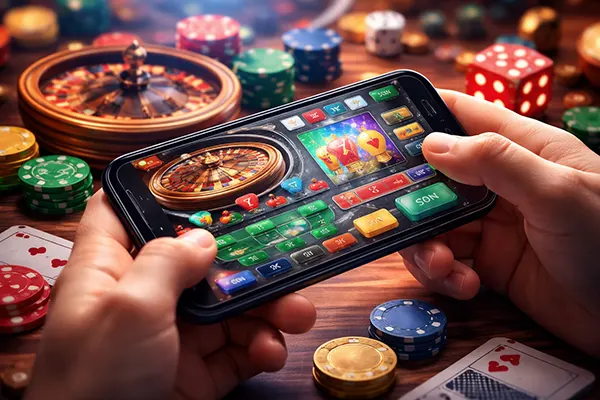
Modern Hybrid Formats: Slots with Live Dealer Elements and Bonus Tables
The online gambling industry has evolved rapidly over the past decade, introducing innovative game formats that merge the excitement of traditional slots with the immersive experience of live dealer tables. By combining interactive features, real-time streaming, and rewarding bonus mechanisms, these hybrid formats offer players a richer and more dynamic form of entertainment. In 2025, such games are gaining strong traction among both slot enthusiasts and fans of live casino tables, thanks to enhanced technology, engaging gameplay, and new approaches to player interaction.
Integration of Live Dealer Features into Slot Games
The addition of live dealer elements to slot games represents one of the most significant recent trends in iGaming. Developers are embedding real-time video streams into slot interfaces, allowing players to interact with professional hosts while spinning the reels. These hosts can comment on gameplay, guide bonus rounds, or trigger special events, bridging the gap between the solitary nature of slots and the social aspect of live tables.
Technical advances, particularly in low-latency streaming and high-definition broadcasting, have made this integration seamless. Modern hybrid slots often feature side panels or integrated frames where the dealer appears without interrupting reel animations. This visual combination ensures a fluid experience without sacrificing the speed or clarity of the slot’s core mechanics.
From a psychological standpoint, the presence of a live dealer can boost engagement by adding a human touch. Players feel more connected to the game when a real person is guiding them through the process, answering questions, or offering commentary during key gameplay moments. This social interaction is increasingly valued in an otherwise automated environment.
Game Examples and Market Leaders
Several game studios are pioneering hybrid formats, delivering titles that showcase the potential of this crossover. Pragmatic Play Live, Evolution, and Playtech have launched hybrid slots that blend traditional mechanics with interactive dealer features. For example, some titles incorporate live bonus wheels that are spun by a host when triggered, adding an unpredictable and exciting layer to standard slot play.
Other variants focus on collaborative elements, where players share a live dealer’s actions but receive individual results on their reels. This allows for a communal experience while maintaining personal outcomes, appealing to a broad spectrum of gambling preferences. The market is steadily expanding, with more studios adopting these mechanics to stand out in a competitive space.
Given the growing adoption of 5G and improved home internet speeds, these games can now reach players in more regions with minimal delay. This accessibility is a key factor in their rising popularity, making them a viable long-term category rather than a niche experiment.
Bonus Tables and Enhanced Reward Structures
Bonus tables within hybrid games have transformed the way rewards are distributed. Instead of relying solely on automated RNG-triggered features, some games use live dealers to physically handle bonus draws, spin wheels, or reveal cards that determine player prizes. This adds transparency and theatricality to the process, heightening anticipation.
The advantage of bonus tables lies in their ability to make reward events more memorable. For example, a player might trigger a bonus round that switches to a live feed of a dealer placing chips or turning over a prize card. These physical actions, combined with RNG-driven mechanics, provide both fairness and entertainment value.
Operators also leverage bonus tables to introduce unique seasonal or promotional campaigns. Dealers can present special limited-time rewards, themed events, or progressive jackpots, offering reasons for players to return regularly. The flexibility of these features allows developers to keep the content fresh and adaptable to marketing needs.
Technological Support and Fairness
Behind the scenes, the integration of bonus tables into hybrid formats relies on advanced synchronisation between the live feed and the digital slot mechanics. Sophisticated back-end systems ensure that the physical actions of the dealer are accurately reflected in the RNG outcomes, maintaining both trust and regulatory compliance.
Licensed and regulated operators must meet strict auditing requirements for these hybrid games. Third-party testing agencies verify that RNG elements remain fair and unbiased, even when live dealers handle part of the gameplay process. This transparency is essential in sustaining player confidence.
Moreover, modern encryption protocols protect the integrity of live streams, ensuring that bonus events cannot be manipulated or intercepted. These technical safeguards are crucial in combining human involvement with automated systems without compromising fairness.

Future Outlook for Hybrid Formats
As technology continues to advance, hybrid formats combining slots, live dealers, and bonus tables are set to evolve even further. Developers are experimenting with augmented reality (AR) overlays, which could allow players to project live dealer environments into their own physical space, making the experience even more immersive.
Artificial intelligence may also play a larger role in personalising these games. For example, AI could analyse a player’s habits and adapt the pace of live dealer commentary, the frequency of bonus events, or the visual themes of the slot interface to match personal preferences. This level of customisation could significantly boost engagement and retention.
In addition, hybrid formats may expand beyond traditional slots and tables into other genres, such as interactive game shows or sports-themed gambling experiences. The versatility of the format makes it a promising area for long-term development, with the potential to become a mainstay in the industry by 2030.
Challenges and Considerations
While the growth potential for hybrid formats is strong, developers and operators must address certain challenges. Regulatory frameworks vary widely across jurisdictions, and ensuring compliance for both the live and automated aspects of gameplay can be complex. Game certification processes may also take longer due to the dual nature of these products.
From a production standpoint, live dealer integration requires skilled staff, professional studio setups, and ongoing operational costs. These factors can make hybrid games more resource-intensive than standard slots, which may impact profitability if not managed effectively.
Finally, maintaining consistent quality across all sessions is critical. Technical issues, such as lag in video streams or desynchronisation between live and RNG outcomes, can damage player trust. Continuous investment in infrastructure and quality assurance is therefore a non-negotiable requirement for success in this space.
-
 The Impact of Mobile Devices on Gambling Game Design an...
The Impact of Mobile Devices on Gambling Game Design an...The widespread adoption of smartphones and tablets has fundamentally reshaped …
12/18/2025See more -
 Casino Games With Skill Elements: Facts Versus Misconce...
Casino Games With Skill Elements: Facts Versus Misconce...Debates about whether skill plays a meaningful role in certain …
12/02/2025See more -
 How to Choose a New Casino in 2025: A Detailed Review T...
How to Choose a New Casino in 2025: A Detailed Review T...The rapid growth of licensed online gambling environments in 2025 …
11/13/2025See more
